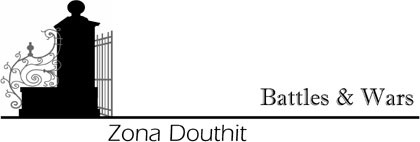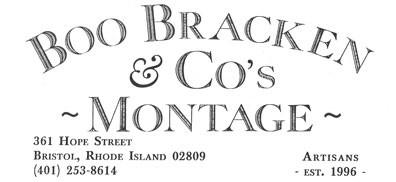




In
1954, the whole family lived in a
big white house with green shutters
on Riverside Drive. The house sat
proudly in a row of stately homes,
some of the best in town.
Nineteen fifty-four was also the
year
World War II caught up with the
entire family, even though the little
kids, Tommy and Patty, hadn’t been
born until after the war. But by

1954, the demons from the Japanese POW camp overtook Dad and shot to hell his bayonet-sharp Marine facade. One Friday night, with the dining room table set for dinner and the little kids watching Mickey Mouse Club in the front room, Bataan came to life again in the foyer next to the Wurlitzer jukebox. Dad punched Mom in the face and broke her nose as she walked through the front door half an hour late, then he started up the stairs to get his gun to “finish the job.”
It was only the aroma of pot roast that had kept the three, pre-war teenage sons home for dinner on a Friday. There was a school dance that night. If that pot roast hadn’t tempted them, they might’ve just grabbed a burger at the drive-in where the girls skated out to the cars to take orders. But they were home, combing hair into perfect ducktails, teasing the little kids, listening to a Buddy Holly 45. They saved Mom’s life, maybe even the little kids’ lives.
It wasn’t easy. All three of them were bruised for a week after the battle with Dad because Dad was fighting Jap demons, and they were just scared boys protecting their mother. Dad was a big man with a barrel chest that proudly displayed all of his war medals when he wore his uniform. The teenage sons were a tall, skinny lot. It took all three of them to drag him off the stairs and out of the house. Dad was never allowed back in.
The next year the oldest son joined the Marine Corps and would never live with the family again. They moved into a smaller house: three bedrooms, no dining room. It was the last house on the street before the mill. The composition siding was a bilish yellow that matched the smell of the sulfur smoke from the mill. Across the street was an abandoned Victorian house. The constant rain had washed it bare of paint. The little kids, Tommy and Patty, hunted for ghosts in it.
By 1956, the second son had joined up, and the remnants of the family moved again, this time to a five-room cottage on the other side of town. Train tracks ran down the middle of the street, and when the trains came by twice a day, the little house rattled as if its dentures were loose. Dad got transferred to Camp Pendelton. Before he left, he signed up the third son, who would get a GED later. Now only Mom and the little kids weren’t in the Marine Corps, at least not any more.
The little house had a yard on the side with a picket fence, but no one mowed the grass. Patty was ashamed about the grass, but no one ever talked about it. Mom worked as a secretary for $400 a month and drove a ’49 Hudson that broke down weekly. No one ever talked about the lack of a man to take care of the car and the grass. Patty was only nine, but Tommy was eleven by then. He could’ve mowed the grass, but he was so angry all the time that Mom just didn’t have the energy to fight with him about it. Besides, he was repeating the fourth grade. She didn’t ask too much of him.
Tommy and Patty were on their own after school. Mom’s only rule was that they stick together. Tommy and Patty usually stayed away from the river. It wasn’t that Mom had warned them so much as that the river was dark and murky, and when the tide was out, the exposed mud flats smelled like the big, eviscerated river rat the cat had left on the porch one morning with the milk bottles. Patty was afraid of the river after that, and while Tommy was fearless and would go anywhere, he usually found things for them to do away from the river. Throughout the autumn they had explored the golden alders and loden green cedars and picked blackberries on the ridge behind the school. During the wet winter they had played Monopoly and Parcheesi at home. A false spring day came in February when it wasn’t raining, but it was too muddy to get up to the ridge. Tommy needed adventure. He wanted to explore the old wharf behind the train turntable. Patty was ashamed to be afraid in the face of Tommy’s perpetual courage, so eventually she gave in.
They tightrope-walked the tracks about a half-mile, past the turntable, past the paint-naked warehouse that hadn’t been used for decades. The wharf was rough-hewn planks, some still held in place by square-headed, rusty nails, some not. Huge logs, eight feet across that must have come from the first cut of the forests at the turn of the century still anchored the wharf into the deep silt. The old logs had stood in the river so long they had sucked up the river’s boggy color. At high tide, the wharf was barely distinguishable from the water.
By the time Tommy and Patty got to the wharf, deep gray clouds had scudded across the sun. What had been a spring breeze was now winter gusts. Patty was only wearing a green cardigan over a short-sleeved Peter Pan blouse and yellow, corduroy pedal pushers. She wanted to turn back.
“We’re here now.” Tommy looked at her like she was a dumb girl.
The wood looked rotten. She didn’t like the river’s being so high. Where did the rats go when the water was high? Tommy pointed out that there were three other boys on the wharf. It had to be okay.
Patty followed him out about half way. The three boys at the end of the wharf were hunched together. They were bigger than Tommy, maybe sixth graders. They looked up. That’s when Patty refused to go a step farther. Tommy went out and said something to them. The boys laughed in a way that made Patty want to go home. Tommy threw a stick into the river. One of the older boys offered Tommy a cigarette. Tommy glanced at Patty then took it. He put it between his lips like he had seen the older brothers do, but he didn’t suck in.
One of the sixth graders walked toward Patty. “I got something for you, too.”
Patty was used to teasing. Her older brothers teased her all the time. Dad said you can only be teased if you want to be teased. Patty stood very still and tried not to want to be teased.
The other two boys trailed along after the first. Tommy watched from the end of the wharf, cigarette smoke whipping around his hand. Suddenly, the three boys were all around her and she couldn’t see Tommy anymore. Then one of them moved as fast as darkness came when a light was switched off. He yanked down her yellow corduroy pedal pushers and her panties with little blue flowers. A cutting wind rushed from behind her and between her bare legs. She shivered; the sixth grade boys laughed and pointed at her little-girl nakedness.
The sinister snickers were still echoing over the river when Tommy pulled her away. She wanted to stop and make him beat them up. Thatís what he should do: beat them up. Only violence could cancel her shame. But he just said quietly that it was time to go home.
They never told Mom and never talked about it. It was like the night Dad fought demon Japs in the front hall. But Patty was mad. Tommy was supposed to protect her. For a lot of years, she kept the image in her mind like a dog-eared photograph in her wallet of Tommy beating those boys and throwing them into the muddy river.
Forty years later on a long car trip, Tom told her how scared he had been hanging out of the back of chopper spraying the Vietnamese jungle with automatic weapon fire, not seeing who or what he might’ve killed. He talked about how the marijuana and tequila had dulled the memories for twenty-five years, how he ran guns into and dope out of places where they spoke Spanish just so he didn’t have to find a home, how he had looked for God on channel 18, even sent a hundred dollars to the post office box on the screen.
That afternoon, Pat decided not to leave her third husband. It was time she stopped expecting so much of men. She wished she had beaten up those sixth grade boys herself.

Timshel Literature